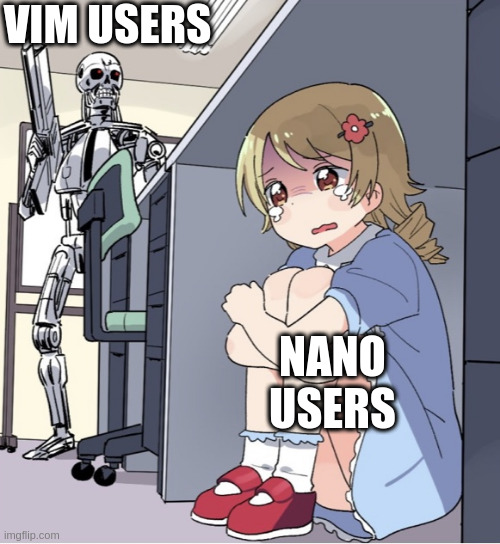this post was submitted on 02 Sep 2024
796 points (93.4% liked)
Linux
53151 readers
992 users here now
From Wikipedia, the free encyclopedia
Linux is a family of open source Unix-like operating systems based on the Linux kernel, an operating system kernel first released on September 17, 1991 by Linus Torvalds. Linux is typically packaged in a Linux distribution (or distro for short).
Distributions include the Linux kernel and supporting system software and libraries, many of which are provided by the GNU Project. Many Linux distributions use the word "Linux" in their name, but the Free Software Foundation uses the name GNU/Linux to emphasize the importance of GNU software, causing some controversy.
Rules
- Posts must be relevant to operating systems running the Linux kernel. GNU/Linux or otherwise.
- No misinformation
- No NSFW content
- No hate speech, bigotry, etc
Related Communities
Community icon by Alpár-Etele Méder, licensed under CC BY 3.0
founded 5 years ago
MODERATORS
you are viewing a single comment's thread
view the rest of the comments
view the rest of the comments

Bruh 😂 the Emacs user community absolutely constantly shit on Vim users. When they added Vi(m) bindings they literally named it 'evil mode', and they constantly make fun of people who use it, and spacemacs, and the latest flavor of (neo)vi(m), and all the extensions necessary to make vim halfway useful as an ide, etc etc etc.
Evil or the extensible vi layer is super popular and improves the one area that emacs was lacking i prefer the emacs keybinds but have never seen peeps chat shit about it
Which Emacs community? I've been following it for ages in a few places (Reddit is the most common) and I literally do not encounter any of that. Calling it evil was humor - as if people who went to all the bother making it would be trying to push people away...
Using the evil package is very popular and often recommended, which means literally using it like vim, but with all the Emacs ability on top. I don't know what on earth you're talking about.
Same here.
The biggest diss I have on emacs users, as a vim user, is that emacs is the only text editor where people routinely need to keep a book about it on their desk!
I used to work with a bunch of emacs guys and they all had an emacs book or two on their desk or as a monitor stand. They usually also had one on awk and/or Perl to go with it.
I’m sure they’d probably make fun of me for being unable to edit a file with anything but my specific vim config, which is not compatible with any other human’s vim config.
(I would never seriously judge someone on their editor, but I will bust an emacs users chops and accept a good natured jab back)
Oh to be clear, it's all humor. At least mostly, I'm sure there are RMS level fanatics somewhere that truly believe some of the BS.
This is something as old as time. I've seen it prolifically on Reddit (though not in the Emacs community, they generally discourage memes), various Linux forums, old Usenet, various programming forums... I'm not trying to be evasive, but it's hard to provide examples that aren't specifically cherry picked, which wouldn't benefit the conversation much.
There's even a Wikipedia page dedicated to this: https://en.wikipedia.org/wiki/Editor_war
How close to vim's functionality is evil mode? I've been toying with the idea of learning Emacs but I rely on Vim's langmap and that is rarely implemented in Vim emulations / bindings.
Although I came from vi (pre-vim and pre-evil) and still have the muscle memory, I don't and haven't used it myself.
I hear it described as a "nearly complete" and "very comprehensive". There is definitely a solid community of people using and enjoying it, but on the other hand there are always some reports of getting tired of having to work through, and sometimes extend, an additional interface layer, so in the long run being happier to just adopt the default bindings.
I know there are a few areas where trying to follow common vim workflows doesn't work as well. Historically the performance of line number display been weak in Emacs, though I believe it's recently much improved. A lot of people seem to make heavy and constant use of it in vim but conversely for me (and I think it's more common in Emacs) it's only an occasional, transient need when some external log or error quotes a line number, so I have them only displayed when I hit the go-to-line binding.
Overall, I think the most frustrating issues people have trying to adopt Emacs from vim are due to trying to impose their specific familiar vim workflows. The most obvious example is people concerned with startup time, but for more typical Emacs workflows it's a non-issue. Users typically stay in Emacs rather than jumping in and out of it from a terminal (and if you really want that workflow, you run one instance as a daemon and pop up a new client to it instantly). My Emacs instance's uptime usually matches my computer's uptime.
The draw of Emacs is not about it only being an editor so much as a comprehensive and programmable text environment. It is a lisp-based text-processing engine that can run numerous applications, the primary being an editor (the default, or evil, or others...) but also countless other applications like file managers, VC clients, subprocess management and many others. It 95% replaces the terminal for me, and many other tools. So it's the environment through which you view and manipulate all things text that is very accessible to modify and extend to fit your needs. Hence the joke about it being an OS is pretty apt, though to believe it needs a good editor implies vim isn't a good editor ;).